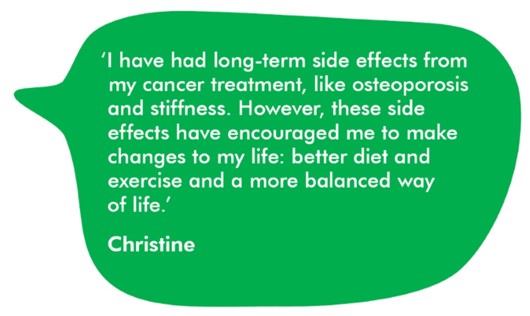We can’t see our bones, so we often forget that we need to keep them healthy. In this blog, written by our intern Hannah, we will look at why bone health is important, what affects it, and how you can improve it.
Why are healthy bones important?
Our bones have several functions. They:
For our bones to do these jobs well they need to be strong and healthy. Poor bone health can lead to thinning of the bones (osteoporosis). With this condition bone density is very low, so bones are weaker and more likely to fracture.
What makes bones unhealthy?
Osteoporosis can be caused by a number of factors:
Some cancer treatments also affect bone health
Your doctor or cancer specialist can give you advice on whether the treatment you have will affect your bone health.
How to keep bones healthy: the do’s and don’ts

As Christine says, there are lifestyle changes you can make to keep your bones as healthy as possible. Here are just a few:
Do eat well:
Do exercise:

Don't smoke:
Don't drink excessively:
Where can I get more information and support?
We have a booklet called Bone Health. It has more information about the importance of bone health, the impact of cancer treatments and how to look after your bones.
We also have information about bone health on our website.
Another organisation that can offer lots of information about osteoporosis and bone health is the National Osteoporosis Society.
If you would like support, our cancer support specialists can also help – you can speak to them by calling 0808 808 00 00. Macmillan can offer a range of emotional, practical and financial support.
To see what else Macmillan's cancer information team has been blogging about, please visit our blog home page! You can subscribe to receive our blogs by email or RSS too.
We're with you every step of the way
The Macmillan team is here to help. Our cancer support specialists can answer your questions, offer support, or simply listen if you need a chat. Call us free on 0808 808 00 00.
Comments? Feel free to add them below (you need to be logged in).
Keep in touch Follow Macmillan’s cancer information team on Twitter @mac_cancerinfo
Whatever cancer throws your way, we’re right there with you.
We’re here to provide physical, financial and emotional support.
© Macmillan Cancer Support 2025 © Macmillan Cancer Support, registered charity in England and Wales (261017), Scotland (SC039907) and the Isle of Man (604). Also operating in Northern Ireland. A company limited by guarantee, registered in England and Wales company number 2400969. Isle of Man company number 4694F. Registered office: 3rd Floor, Bronze Building, The Forge, 105 Sumner Street, London, SE1 9HZ. VAT no: 668265007